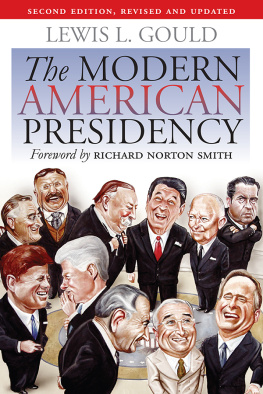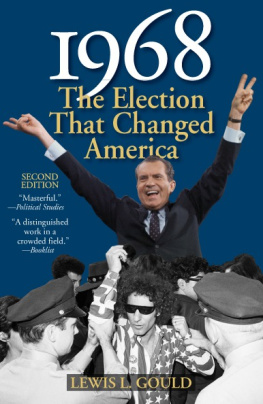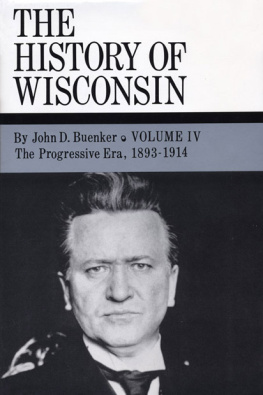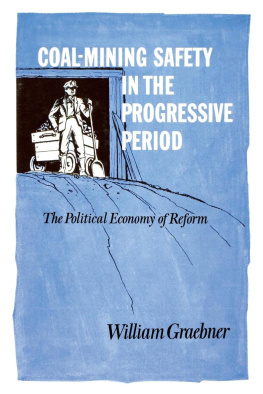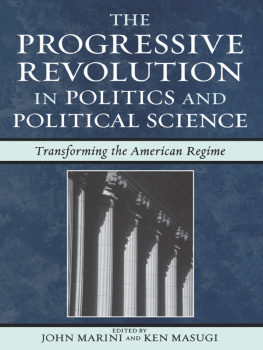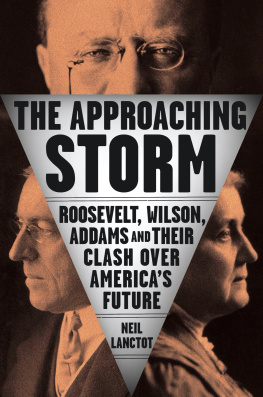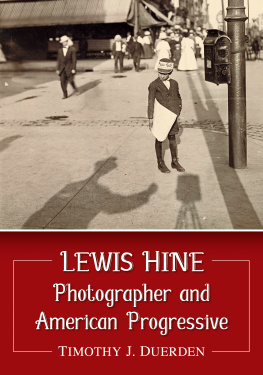First published 2001 by Pearson Education Limited
Published 2013 by Routledge
2 Park Square, Milton Park, Abingdon, Oxon OX14 4RN
711 Third Avenue, New York, NY 10017, USA
Routledge is an imprint of the Taylor & Francis Group, an informa business
Copyright 2001, Taylor & Francis.
The right of Lewis L. Gould to be identified as author of this work has been asserted by him in accordance with the Copyright, Designs and Patents Act 1988.
All rights reserved. No part of this book may be reprinted or reproduced or utilised in any form or by any electronic, mechanical, or other means, now known or hereafter invented, including photocopying and recording, or in any information storage or retrieval system, without permission in writing from the publishers.
Notices
Knowledge and best practice in this field are constantly changing. As new research and experience broaden our understanding, changes in research methods, professional practices, or medical treatment may become necessary.
Practitioners and researchers must always rely on their own experience and knowledge in evaluating and using any information, methods, compounds, or experiments described herein. In using such information or methods they should be mindful of their own safety and the safety of others, including parties for whom they have a professional responsibility.
To the fullest extent of the law, neither the Publisher nor the authors, contributors, or editors, assume any liability for any injury and/or damage to persons or property as a matter of products liability, negligence or otherwise, or from any use or operation of any methods, products, instructions, or ideas contained in the material herein.
ISBN 9780-58235671-9 (pbk)
British Library Cataloguing-in-Publication Data
A catalogue record for this book is available from the British Library
Library of Congress Cataloging-in-Publication Data
Gould, Lewis L.
The progressive era: America, 18901914/Lewis L. Gould.
p. cm. - (Seminar studies in history)
Includes bibliographical references and index.
ISBN 0-582-35671-7 (pbk.)
1. United States-Politics and government-l8651933. 2. Progressivism (United States politics) 3. United States-Social conditions-18651918. 4. United States-Economic conditions-18651918. I. Series.
E661 .G675 2000
Such is the pace of historical enquiry in the modern world that there is an ever-widening gap between the specialist article or monograph, incorporating the results of current research, and general surveys, which inevitably become out of date. Seminar Studies in History are designed to bridge this gap. The series was founded by Patrick Richardson in 1966 and his aim was to cover major themes in British, European and world history. Between 1980 and 1996 Roger Lockyer continued his work, before handing the editorship over to Clive Emsley and Gordon Martel. Clive Emsley is Professor of History at the Open University, while Gordon Martel is Professor of International History at the University of Northern British Columbia, Canada, and Senior Research Fellow at De Montfort University.
All the books are written by experts in their field who are not only familiar with the latest research but have often contributed to it. They are frequently revised, in order to take account of new information and interpretations. They provide a selection of documents to illustrate major themes and provoke discussion, and also a guide to further reading. The aim of Seminar Studies is to clarify complex issues without over-simplifying them, and to stimulate readers into deepening their knowledge and understanding of major themes and topics.
Readers should note that numbers in square brackets [] refers readers to the corresponding item in the Documents section which follows the main text.
During the quarter of a century that elapsed between 1890 and 1914, the United States went through a period of political, social, and economic reform that has come to be known as the Progressive Era. By the time that World War I erupted in Europe during the summer of 1914, the public life of the United States had undergone significant changes that shaped the domestic agenda of the nation for the rest of the twentieth century. Because the Progressive Era was so central to the way the history of the United States unfolded for the next eight decades, scholars have devoted extensive attention and voluminous writing to understanding what happened and why [].
By 1914, the national government had adopted policies to intervene in the workings of the economy and to regulate the behavior of individuals and corporations in society that would have seemed inconceivable to the politicians and the public twenty-five years earlier. By the second year of Woodrow Wilsons presidency, the United States had created a central banking mechanism (the Federal Reserve system), adopted an income tax, established national regulatory agencies (the Federal Trade Commission), and amended the Constitution to have senators elected by the people rather than by state legislatures. Vigorous campaigns to grant the vote to women and to prohibit the sale and manufacture of alcoholic beverages were under way. As one progressive from Texas put it in 1910, more and more Americans now believed that governments were created for the protection of the weak against the encroachments of the strong and served as the familiar forum of the contest between the strong and the weak, the powerful and the helpless, the many and the few, between the general and the special interests [ p. 26].
Twenty-five years earlier, the agenda of the national government had been very different. In the Fifty-First Congress that met during 188990, there were some stirrings of protest against big business that expressed themselves in the passage of the Sherman Antitrust Act (1890), but the major issues involved such perennial questions as the nature of the currency, the use of tariffs to protect American industry from foreign competition, and the honesty and fairness of elections in the South where African Americans faced racial discrimination. Where the public men and ].
A second change between 1890 and 1914 had to do with the role and place of the political party in making decisions about the future of the nation. In 1890 the two major political parties, the Republicans and the Democrats, were in charge of how candidates were selected, elections were held, and policies were adopted. Male citizens were intensely partisan and were convinced that political parties were the best means to conduct public life. American white men, the holders of the right to vote in most of the country, turned out for elections at rates that would not be matched in the next century. In the northern and middle western states, turnouts of 7080 percent in presidential elections were commonplace. As one politician put it, We love our parties as we love our churches and our families. We are part of them [ p. 215]. Allegiance to a party was one of the ways that Americans defined their place in the community.


